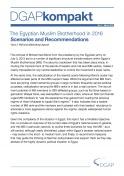Abstract:
The removal of Mohammed Morsi from the presidency by the Egyptian army on July 3, 2013 led to a number of significant structural transformations within Egypt’s Muslim Brotherhood (MB). The security crackdown that has taken place since, including the imprisonment of thousands of leaders and mid-level MB cadres, makes it nearly impossible for any central leadership to control the movement’s lower ranks. At the same time, the radicalization of the Islamist scene following Morsi’s ouster has affected at least parts of the MB’s support base.
While the argument that MB members are joining violent extremist groups in large numbers frequently serves political purposes, radicalization among the MB’s ranks is in fact a real concern. The recruitment potential of MB members to ISIS-affiliated groups, such as the Sinai-based organization Wilayat Sinai, was exemplified in a recent video, where an ISIS commander urged MB members to “use the experience they gained from ousting the previous regime of Hosni Mubarak to topple Sisi’s regime.” It also indicates that a sizable number of MB rank-and-file members are frustrated with their leaders’ reluctance to advocate a more aggressive stance against the regime, despite widespread human rights violations.
Given the complexity of the situation in Egypt, this report has a threefold objective: first, to provide an overview of the current state of Egypt’s national scene in general, and the MB in particular; second, to outline three scenarios for how the MB – as a still central, although vastly diminished, player within Egypt’s broader national scene – may evolve in the short to medium term; and finally, to recommend measures that may guide the thinking of German policymakers and support them as they stay abreast of the highly dynamic political situation in Egypt.


